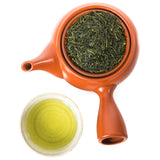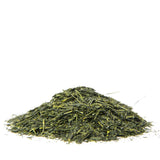DUE TO HIGH DEMAND, THIS TEA IS OUT OF STOCK
IT WON'T BE AVAILABLE UNTIL THE NEXT HARVEST IN SPRING.
SIGN UP FOR OUR NEWSLETTER TO STAY UPDATED
– Oh, Sensei! – the samurai exclaimed, – I am so impressed! What is this tea that is so refreshing and comforting, with a taste so bold and sweet, yet so fresh that Spring itself returned once again!?
– This tea is Sencha. Now hang your sword, forget all your worries, and just enjoy.
Sencha is known and loved for its sweetness, mild astringency, and flowery-green aroma.
Sencha (煎茶) is a staple Japanese Green Tea. Its name is straightforward and translates as "steeped tea".
This Sencha is processed as Fukamushi Cha (深蒸し茶 – deep-steamed tea), which means that it undergoes a slightly extended steaming process compared to the standard steaming (普通蒸し茶 – Futsumushicha), which typically lasts around 30-45 seconds. In contrast, Fukamushicha is steamed for about a minute, resulting in a tea that boasts a more pronounced sweetness and body while suppressing excessive astringency.
Harashima-san skillfully produces this Organic Fukamushi Sen Cha from the Okumidori cultivar from Yame. Thriving at the summits of the Yame Mountains, the tea leaves endure winter, protected by a blanket of snow. This snowy coat nurtures the leaves, imbuing them with nutrients that contribute to the tea's bold and delectable flavor profile.
When brewed, the Organic Fukamushi Sencha unfolds into a deep-green tea soup with a delightful artichoke aroma with hints of chestnut. Its character boasts a round mouthfeel, accompanied by a lingering umami that distinctly reflects the essence of Yame's teas.
The region of Yame in Fukuoka prefecture prides itself on housing some of the finest tea farms. Veiled in the morning mists and river fogs, Yame's green tea fields bask in soft sunlight, ensuring the leaves grow tender and sweet. Additionally, Yame benefits from a significant temperature disparity between day and night, further contributing to the tea's distinct character.
Watch a video about Sencha and Senchado
Watch a video on how to brew Sencha Green Tea
Brewing guidelines:
![]() 165℉ / 75℃ for the first infusion; 175ºF / 80ºC for subsequent infusions
165℉ / 75℃ for the first infusion; 175ºF / 80ºC for subsequent infusions
![]() 1g per 60ml
1g per 60ml
![]() 1-2min for the first infusion; then flash infusion, then 30-second infusion
1-2min for the first infusion; then flash infusion, then 30-second infusion



